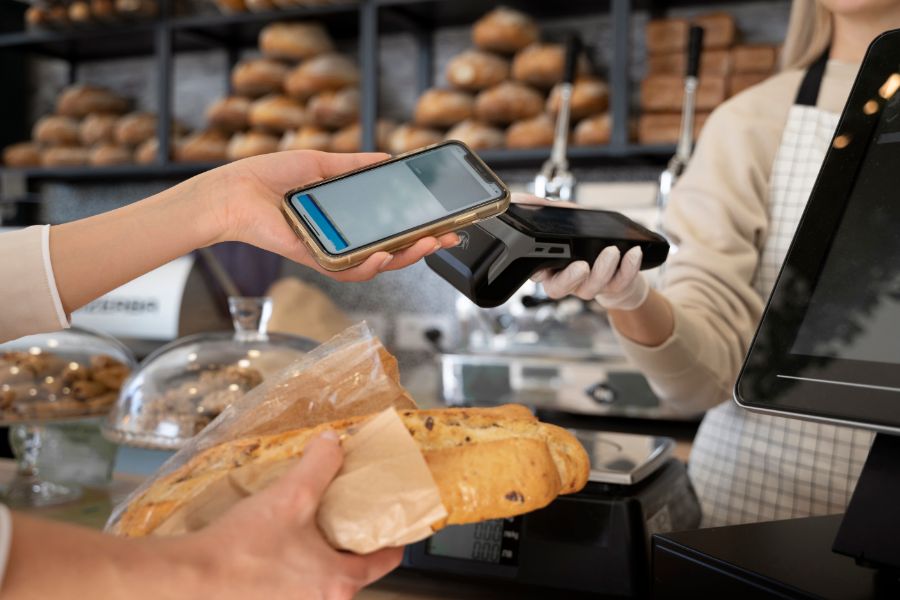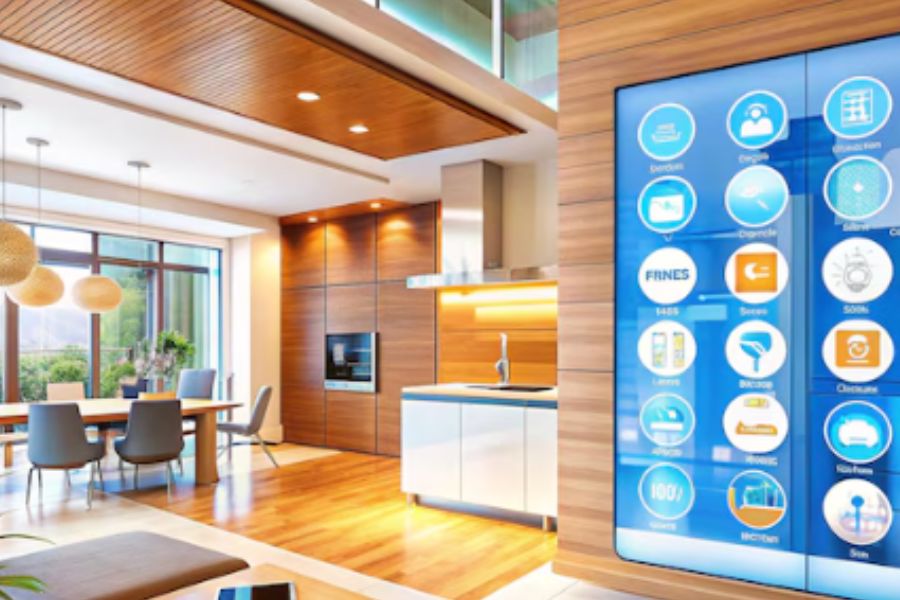In the evolving landscape of furniture retail, the right point of sale (POS) system is pivotal for success. As we delve into the intricate requirements of furniture stores in 2025, the emphasis on an advanced POS system becomes evident. This article explores the 5 must-have features in a POS system for furniture store in 2025, shedding light on the technological advancements crucial for operational excellence.
Amidst the dynamic market demands, integrating a robust POS system for furniture stores is not just a choice but a necessity. Let’s explore the quintessential features that define the future-ready POS solutions tailored for the furniture industry.
The significance of a POS system for furniture store
In the realm of furniture retail, the adoption of point-of-sale (POS) systems stands as a transformative stride. These systems are not merely transactional tools; they are strategic assets that redefine the operational landscape for furniture stores. The significance of POS systems lies in their ability to streamline complex processes, enhance customer experiences, and elevate overall business efficiency.
Firstly, POS systems bring about operational efficiency. In the intricate world of furniture retail, where inventory management and order processing demand precision, a well-integrated POS system becomes a cornerstone. It ensures real-time tracking of inventory, facilitating accurate stock levels and minimizing the risk of overstocking or stockouts.
Secondly, the significance extends to customer engagement and satisfaction. POS systems empower furniture stores to provide personalized and seamless experiences. Customer purchase history tracking allows for tailored recommendations, promotions, and loyalty programs. This not only fosters customer retention but also amplifies brand loyalty.
Moreover, POS systems contribute to robust sales management. The centralized nature of these systems enables comprehensive sales tracking, aiding in strategic decision-making. Furniture stores can analyze sales trends, identify top-performing products, and optimize pricing strategies.
In addition, the ability of POS systems to integrate seamlessly with other technologies and platforms is paramount. This integration facilitates a unified approach to data management, ensuring consistency across online and offline channels. A synchronized multichannel experience becomes a reality, offering customers flexibility in how they interact with the furniture store.
Ultimately, the significance of a POS system for furniture store lies in its transformative impact on the entire retail ecosystem. By enhancing operational agility, fostering customer-centric approaches, and embracing the possibilities of seamless integration, POS systems become indispensable allies in navigating the complexities of the contemporary furniture retail landscape. As furniture stores strive for adaptability and excellence, investing in a robust POS system becomes a strategic imperative, promising a future where efficiency, customer satisfaction, and business growth converge seamlessly.
Understanding the 5 essential features in POS systems for furniture stores in 2025
In the ever-evolving landscape of furniture retail, staying ahead requires a point of sale (POS) system that goes beyond transactional processing. As we step into 2024, the furniture industry demands advanced solutions equipped with five key features, each designed to address specific challenges and enhance overall operational efficiency.
- Efficient product management: in 2024, furniture retailers seek POS systems with robust product management capabilities. This entails diverse features to handle the intricacies of a wide range of furniture items efficiently. The significance lies in streamlining inventory processes, reducing errors, and ensuring a seamless customer shopping experience.
- Barcode functionality: speed and accuracy in transactions are paramount. Including quick and precise barcode reading features simplifies the sales process, minimizing errors and expediting customer checkout. Integration with inventory management ensures real-time tracking, promoting accuracy in stock management.
- Flexible inventory management: real-time inventory tracking and automatic ordering are pivotal features. They provide furniture stores with the ability to adapt to fluctuating demands, prevent stockouts or overstocking, and maintain optimal inventory levels. In 2024, the focus is on systems that offer dynamic, flexible inventory management.
- Customer app integration: as customer-centric strategies gain prominence, POS systems with integrated customer apps become indispensable. These features enable furniture retailers to track customer purchase history, offer personalized promotions, and strengthen customer loyalty. The goal is to provide an enhanced, personalized shopping experience.
- Multichannel support: the modern consumer journey involves multiple touchpoints. A POS system that seamlessly integrates online and offline order placement, synchronizing data across channels, ensures a unified shopping experience. This is essential for meeting the demands of omnichannel retail in 2024.
The benefits these features bring:
- Enhancing shopping experience: customers experience a streamlined and personalized journey, from product selection to checkout, enhancing overall satisfaction.
- Improving business performance: operational efficiency, accurate inventory management, and personalized customer interactions contribute to improved business performance and profitability.
- Adapting to the 2025 furniture market: these features position furniture stores to adapt flexibly to the changing dynamics of the furniture market in 2024, fostering resilience and competitiveness.
Understanding these essential features provides a foundational insight into the strategic advantages that POS systems can offer furniture retailers in 2024. The subsequent detailed exploration will delve into each feature, unraveling their intricacies and showcasing their profound impact on the furniture retail landscape.
What you need to know about these 5 essential features in POS systems
In the realm of point of sale (POS) systems, certain features stand out as crucial for the seamless functioning of businesses. As we navigate through the intricacies of modern retail, here are five essential features that a robust POS system must embody:
Efficient product management
- Diverse product management features: a cutting-edge POS system should offer a comprehensive suite of tools to efficiently manage a diverse range of products. This includes features for handling different variants, tracking inventory, and streamlining product updates.
- Effective search and categorization features: intuitive and effective search functionalities, coupled with robust categorization features, are essential. This ensures that businesses can swiftly locate products, simplifying inventory management and providing a smoother customer shopping experience.
Barcode functionality
- Quick and accurate barcode reading features: the ability to swiftly and accurately read barcodes is fundamental for efficient and error-free transactions. This feature expedites the checkout process, contributing to a positive customer experience.
- Integration of barcode functionality with inventory management: the integration of barcode functionality with inventory management is crucial. It facilitates real-time tracking, minimizes errors, and ensures that inventory levels are always up-to-date, preventing issues such as overstocking or stockouts.
Flexible inventory management
- Real-time inventory tracking and updates: real-time inventory tracking is imperative for modern businesses. This feature provides a live view of stock levels, enabling businesses to make informed decisions and respond promptly to changes in demand.
- Automatic ordering and supplier management features: automation in ordering and supplier management is a time-saving and efficiency-boosting feature. By automating the reordering process and effectively managing supplier relationships, businesses can maintain optimal inventory levels and minimize disruptions.
Customer app
- Customer purchase history tracking: a robust POS system should include features for tracking customer purchase history. This not only aids in understanding customer preferences but also enables businesses to offer personalized recommendations and services.
- Customizable offers and promotions: to enhance customer engagement and loyalty, a POS system should support customizable offers and promotions. This feature empowers businesses to tailor discounts and rewards based on individual customer behavior and preferences.
Multichannel support
- Integration of online and offline order placement: the contemporary retail landscape demands seamless integration between online and offline channels. A POS system should facilitate the integration of online and offline order placement, providing customers with a unified shopping experience.
- Synchronized multichannel data: ConnectPOS, a leading POS system, excels in providing synchronized multichannel data. This means that whether a customer purchases online or in-store, the data is seamlessly synchronized, ensuring consistency and coherence across all channels. Incorporating these essential features into a POS system not only addresses the immediate operational needs of businesses but also positions them strategically to thrive in the dynamic landscape of modern retail. ConnectPOS, with its commitment to excellence, seamlessly integrates these features, offering businesses a holistic and efficient POS solution.
Why these features are necessary?
In the realm of furniture retail, the adoption of advanced features in point of sale (POS) systems goes beyond mere technological sophistication; it’s a strategic necessity that addresses crucial aspects of the industry. Let’s delve into why these features are indispensable for furniture stores POS, focusing on enhancing the shopping experience, improving business performance, and adapting flexibly to the evolving landscape of the 2024 furniture market.
Enhancing the shopping experience
The modern consumer seeks more than just a transactional interaction when shopping for furniture. A robust POS system, equipped with efficient product management, barcode functionality, and integrated customer apps, contributes significantly to enhancing the overall shopping experience.
- Versatile product management: diverse product management features to cater to the varied needs of customers, ensuring a comprehensive and easily navigable product catalog.
- Barcode functionality: quick and accurate barcode reading features streamline the checkout process, minimizing wait times and ensuring a smooth transaction experience.
- Customer apps: integrated customer apps provide a personalized touch, allowing customers to track their purchase history, receive customized offers, and engage more deeply with the brand.
Improving business performance
The operational backbone of any furniture store relies on the seamless integration of inventory management, ordering processes, and supplier relationships. The essential features of a POS system contribute to improving business performance in several key areas.
- Real-time inventory tracking: dynamic inventory management ensures accurate stock levels, reducing instances of stockouts or overstocking, and optimizing overall inventory control.
- Automatic ordering and supplier management: automation in ordering processes and efficient supplier management minimizes delays, excess inventory, and missed opportunities, thereby enhancing operational efficiency.
Adapting flexibly to the 2025 furniture market
As the furniture market continues to evolve, adaptability becomes a critical factor for sustained success. The outlined features in POS systems are designed to facilitate flexibility and agility, enabling furniture stores to thrive in the ever-changing landscape of 2024.
- Multichannel support: The integration of online and offline order placement, coupled with synchronized multichannel data, allows furniture stores to provide a unified shopping experience, meeting the expectations of modern consumers who engage with brands across various channels.
- Adoption of technological trends: features such as barcode functionality and customer apps reflect an embrace of technological trends that resonate with contemporary consumers, ensuring that furniture stores stay relevant in a tech-savvy market. These features are not just functional elements; they are strategic tools that bridge the gap between traditional retail and the modern consumer’s expectations. By prioritizing the enhancement of the shopping experience, optimizing business performance, and adapting flexibly to the dynamics of the 2024 furniture market, furniture stores can positionthemselves for sustained success and growth.
Frequently asked questions (FAQs) about the POS system for furniture store
What is a POS system and why is it essential for furniture stores?
POS system defined: a point of sale (POS) system is a comprehensive software and hardware solution that facilitates transactions between a business and its customers. It goes beyond traditional cash registers, incorporating advanced features for inventory management, sales tracking, and customer interactions.
Essentiality for furniture stores: in the context of furniture stores, a POS system is essential due to its multifaceted functionality. It streamlines transactions, provides real-time inventory insights, and enhances customer engagement. The holistic management offered by a POS system significantly contributes to operational efficiency.
How does a POS system optimize product management?
- Diverse product management: a robust POS system optimizes product management through diverse features. It enables the efficient organization and categorization of products, making it easier for customers to navigate through a comprehensive product catalog.
- Effective search and categorization: advanced search functionalities ensure customers can quickly locate desired items. Effective categorization streamlines the browsing experience, aiding both customers and store staff in managing and presenting the extensive range of furniture products.
Why is barcode functionality important for furniture stores?
- Enhanced accuracy and efficiency: barcode functionality is pivotal for ensuring accuracy and efficiency in the sales process. Quick and accurate barcode reading features significantly reduce errors during checkout, improving the overall customer experience.
- Integration with inventory management: the integration of barcode functionality with inventory management systems automates tracking. This integration ensures that stock levels are accurately reflected, minimizing discrepancies and optimizing inventory control.
Benefits of integrating the POS system with the customer app?
- Customer purchase history tracking: integration with customer apps allows furniture stores to track and analyze customer purchase history. This data empowers businesses to understand customer preferences and behavior, enabling personalized interactions.
- Customizable offers and promotions: a POS system integrated with a customer app facilitates the implementation of customizable offers and promotions. This not only enhances customer satisfaction but also fosters loyalty through targeted incentives.
Why is flexible inventory management crucial in the furniture industry?
- Real-time inventory tracking: flexible inventory management is crucial in the dynamic furniture industry due to the need for real-time tracking. It allows businesses to stay informed about stock levels, preventing stockouts or overstocking.
- Automatic ordering and supplier management: automation in inventory processes, including automatic ordering and efficient supplier management, is essential. This flexibility ensures that furniture stores can adapt to market demands, minimize delays, and capitalize on business opportunities effectively.
Conclusion
Embracing these essential features is pivotal for furniture stores eyeing success in 2025. The transformative power of an advanced POS system lies in its ability to enhance operational efficiency, elevate customer satisfaction, and adapt seamlessly to market dynamics. If you want to explore further insights into these must-have features of a POS system for furniture store or discuss their implementation, feel free to contact us. Your inquiries are welcome, and we’re here to assist you in navigating the future of furniture retail.



